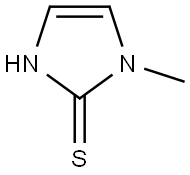Methimazole is an antithyroid medication used in the therapy of hyperthyroidism and Graves disease. It works by making it harder for the body to make thyroid hormone.
It is also known as thiamazole, is a thioamide and a thyroid hormone antagonist which acts by inhibiting the incorporation of iodine into tyrosyl residues of thyroglobulin and, thus, lowering thyroid hormone levels.
It resembles propylthiouracil both in chemical structure and activity.
Methimazole is primarily used for the treatment of hyperthyroidism, by inhibiting the peroxidase system, hindering thyroxine (T4) and tri-triiodothyronine (T3) synthesis, animal experiments show that it can inhibit B lymphocytes synthesizing antibodies, and reduce levels of thyroid stimulating antibodies in blood circulating it can make suppressing T cell function return to normal, it is applicable to hyperthyroidism caused by a variety of factors . Like other various drugs (propylthiouracil), it also has some adverse reactions while it is taken, Including hematologic adverse reactions, primarily neutropenia, hematopoietic dysfunction or disorder, thrombocytopenia, reduction of prothrombin or factor VII ; long-term medication can also cause liver damage,such as cholestatic jaundice and toxic hepatitis ; other skin reactions such as hair loss, itching, rash, dermatitis, lupus erythematosus, as well as some other rare adverse reactions. Also methimazole allows prothrombin time to prolong , and increases serum alkaline phosphatase, aspartate aminotransferase (AST) and alanine aminotransferase (ALT)and causes blood bilirubin and blood lactate dehydrogenase increasing. Therefore, patients in the medication should regularly take blood tests, liver function tests and peripheral blood leukocytes.
The above information is edited by the Chemicalbook of Tian Ye.

